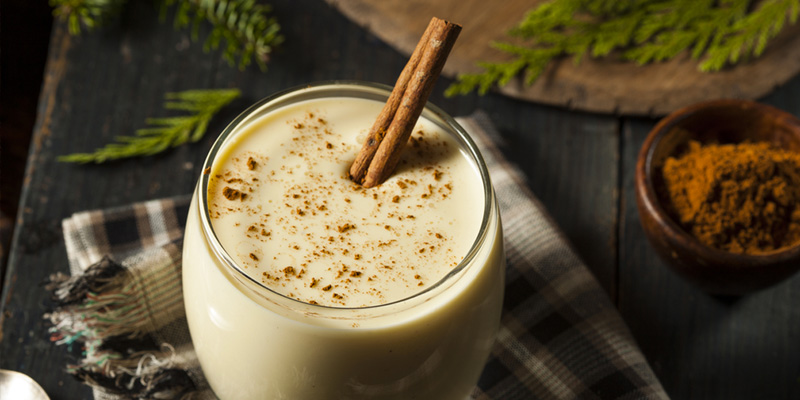Are there really raw eggs in eggnog? Am I going to get sick drinking this drink?
If you’re buying eggnog in the store and simply adding your own alcohol, or if you’re drinking it sans booze, it’s completely safe to drink; it’s already been pasteurized. But if you’re making the drink from scratch, you’re going to need to include raw eggs. Lucky for you, scientists have proved you’re safe. Even though you might worry about the dangers of salmonella in raw eggs, the good folks over at Science Friday conducted an experiment in 2010 where they actually injected a batch of homemade eggnog with salmonella. Then they sat back and watched what happened. Turns out, the alcohol actually killed off all the bacteria, which gives you a second reason — being with family of course being the first — to make it strong.
Is it true that hops are related to cannabis?
Yes, it certainly is, which probably explains why you’ve seen so many IPAs on the market with words like “dank,” “420,” and “spaced” or “baked” in the titles. Hops and cannabis are very closely related and belong to a single family, Cannabaceae. Before you get too excited, cannabis contains THC — which is the part of it that makes you high when you smoke it — while hops do not, though some brewers in Colorado are starting make make marijuana beer. But that’s a whole other article.
My husband and I were very excited to try out this trendy new bar. The place was listed as a top-ten restaurant by one of the big food magazines. When we sat down, we told the sommelier that we like California Pinot Noir, and asked him to recommend something. He chose a $100 bottle of wine for us! That was a lot, but he guaranteed that we would enjoy it. When he popped the bottle (a natural wine) and we tasted it, we found it to be incredibly high in acidity, more like juice than wine, really. We didn’t like it at all, and we told him so. He was very annoyed, and made us feel bad for asking for something else. I started to get embarrassed, so I told my husband not to make a scene, and we were stuck with the bottle. But who was in the right here? Bottom line: When is it O.K to send back a bottle of wine?
Sending back a bottle of wine when there is nothing integrally wrong with it — like being corked or cooked — is tough. But there are still situations — like yours! — when it is perfectly O.K to do so.
Ordering an unknown wine is a delicate dance where both the somm and the customer need to be open and honest to ensure a bottle is popped that the customer will enjoy. If the sommelier had accurately described the wine to you — in other words, if he had told you it had high acidity and had done his best to describe the flavors (maybe not saying it tasted like juice, but coming pretty close) and then you simply didn’t like it after agreeing to purchase the wine described, you really should suck it up and drink the bottle. In this scenario, the somm would have done his job to the best of his ability. Good restaurants and bars would probably still take the bottle back, but they would be right to be a bit annoyed about doing so.
On the other hand, if you said you wanted something that tasted like a Malbec, and without giving you any real descriptors the sommelier brought you something that tasted more like a Beaujolais, that’s on them. From the scenario you described above, that’s what this situation sounds like. Most California Pinot Noirs are ripe and rich and fuller-bodied, with acidity, yes, but not as much as you’d find in a Pinot from Oregon’s Willamette Valley, or in a lot of natural wines. The hot California sun creates riper and sweeter fruit. If the somm didn’t have a wine that could relate to the style of Pinot you like, he should have told you so. If instead he simply brought some random bottle as you described above, it is totally O.K for you to have told him the wine wasn’t what you expected and to ask him to recommend something else. They can always sell the open bottle by the glass.

